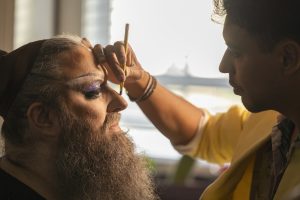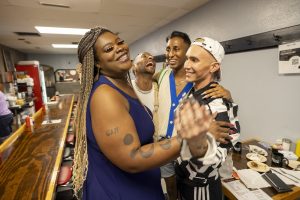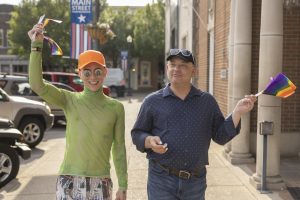Awards Daily talks to the cast of drag queens from We’re Here Season 4 who open up about how their work (and werk) on the HBO documentary series.
In Season 4 of HBO’s We’re Here, we’re introduced to a new set of queens taking over small towns—although they’re not new if you’re a fan of RuPaul’s Drag Race.
This season, Priyanka, Sasha Velour, Jaida Essence Hall, and Latrice Royale combat drag bans in Tennessee and Oklahoma while also recruiting townspeople to try the artform themselves, culminating in a live performance. We’re Here is more than just drag; it’s social work, it’s discovering your own fabulousness, and it’s a little bit of therapy (even for the queens themselves).
“Signing up for the show, it’s a lot of important work,” said Jaida Essence Hall. “After receiving the call, I thought, ‘If you’re going to do this, you need to be fully available to do this.’ But also having my sisters there on the show, it’s easy to know that we’re not doing it alone.”
The series has never been more relevant or pregnant with urgency, and what started as a social experiment in previous seasons has evolved into a call to action, with the queens making a statement just by walking into governmental buildings and existing.
“It looks like we’re just traipsing into the city hall meeting, but it does feel like a bulletproof vest,” said Priyanka. “When I’m out of drag, too, I still feel that bulletproof vest. That’s why I like getting the drag daughters to do drag because they get a sense of that and can apply it to their real life. If you can sing a pop song and entertain in heels, a corset, and a wig, there’s something about that that makes people feel fearless.”
‘That Shit’s Real. People Don’t Talk About That Often.’

Season 4 tackles a spectrum of trans and LGBT stories, including that of Bradford, a professional musician who participates in the queens’ drag show to show support for his trans son and queer daughter.
“That Bradford storyline is one of the most important stories for a lot of Republican and conservative people to see,” said Priyanka. “It’s an honest look. Also, him being an amazing singer and storyteller. Read me the phonebook, hun. What happens is you have to mourn the loss of your daughter because you have a son—that shit’s real. People don’t talk about that often. I like his story because it does serve in the middle of this realness and this hesitation, like ‘I’m not saying no, but I’m not 100% because I’m uncomfortable with what it means for my community, faith, and how I’m perceived.’ That’s a hard thing for parents to have to go through. One thing I’ve learned about parents is that we as queer kids have to be patient with our parents, too.”
In another storyline, Sasha Velour’s drag daughter, Jess, struggles with coming out as a trans woman at 45.
“I felt so protective of her because this is such a vulnerable time for trans and nonbinary people,” said Velour. “That part in your transition where you don’t feel like yourself and you can’t imagine getting there, and also in the world right now, with all the limitations on medical care and employment limitations and housing—she has every right to be scared and to be conservative with her transition. And then to share that with the world? Because she needed a push and has always found solace in drag, that meant so much and that was a big responsibility. Drag has been there for you, and I’m going to make sure drag stays here for you.”
In an especially powerful discussion with Velour, Jess’s estranged wife says, “It would be harder to let Jess go than Troy go.”

“It’s a really complex moment in their relationship, and it’s always going to be complicated. But the fact that there’s so much love and support there, even with all the complex feelings around gender and attraction, there’s this sense that there’s something really gorgeous about Jess and who she’s becoming. That’s so beautiful and not a lot of trans and nonbinary people always experience that. It takes a long time to experience that, and it was really encouraging.”
Audiences also learn about what it means to be intersex, or when a person is born with both female and male biological traits, with Jaida Essence Hall’s drag daughter, Maleeka.
“She has so much more understanding about herself now,” said Hall. “That’s why the show is so important. I had never met a person who was intersex—although I’m sure I have met people who are intersex—but have never met someone who was open about it. Maleeka had to make so many coming-out stories over and over again. I knew it would be extremely sensitive to her and I didn’t want her to feel pressured in any way. If this is something we talk about on the show, it’s her story to tell. The fact that she opened up about it and was so free with me, it even made me recognize something about myself. What is so special about me that someone I love so much and feel is so special was able to trust me?”
Different City, Different Circumstances
Jaida Essence Hall and Latrice Royale split duties across Tennessee and Oklahoma, and Royale said that coming in later felt like jumping on a moving train.
“But at the same time, because it was a new city, everyone was at square one again,” said Royale. “Everyone was on the same playing field because no one knows what’s going to happen. Even though Priyanka and Sasha had a little bit more practice, it didn’t matter because different city, different circumstances. I just jumped in, I was ready to go.”
Just as the group gets their drag daughters to come out of their comfort zone, the queens also put themselves in fish-out-of-water situations, like when they venture to a biker bar dressed in hyper-masculine garb (Velour in fake plastic muscles).
“We looked ridiculous!,” exclaimed Royale. “Hilariously funny! At the same time, we stuck out more than we fit in for the wrong reasons. I think we would have been better off in drag, it would have been less awkward. I had this ‘Oh lord’ feeling and that was all dispelled once I got to know these people, they were a hoot! They were fun, chill, accepting, and cool. It was the complete opposite of what I expected it to be.”
‘Slightly Imperfect Parts Are There Because That’s Part of Drag’
What sets apart this series from other similar shows is that it allows space for discussion among opposing views while also encouraging cast members to thrive and grow themselves. Granted, some discussions don’t go well (particularly one with a father and daughter in Tennessee), but everyone leaves a little better from living in these small towns for a little while.

“Once we pushed past first impressions or our own biases with white men in the south or Christian people, we developed these really close connections with all of our drag kids and felt protective of them,” said Velour. “We wanted to make sure the way they were coming across was truthful to their vision of themselves and all the complexity that they have. I think it’s good that the slightly imperfect parts are there because that’s part of drag; the human imperfect nonbinary quality that we all have should be celebrated.”
Over the course of her episodes, Latrice Royale came to terms with her own relationship with drag and religion.
“My faith was affirmed throughout this experience,” said Royale. “I never expected to hear a man of faith tell me that my drag was a ministry and was valid and was doing good and that I was welcome in this house and tabernacle. All those words were so validating and moved me to tears. I was an emotional mess because I never thought I’d see the day. I didn’t expect I was going to be going through therapy through this, but it was a very healing experience for me.”
“You’re never too old to learn something new” turns out to be an important lesson for everyone on the show. Priyanka believes We’re Here recognizes life as one big celebration of learning about yourself.
“I think it’s a reflection that you never stop learning and growing,” said Priyanka. “This old dog is learning a lot of new shit about herself. We as a society can never stop learning and growing. A lot of the things we do on We’re Here is a reflection of that.”
We’re Here airs on HBO and streams on MAX.














![2025 Oscars: Can a Late-Breaker Still Win Best Picture? [POLL]](https://www.awardsdaily.com/wp-content/uploads/2024/10/gladiator-350x250.jpg)

